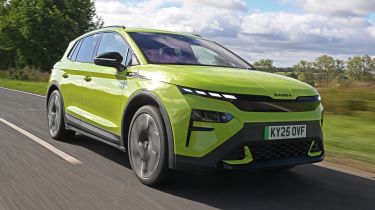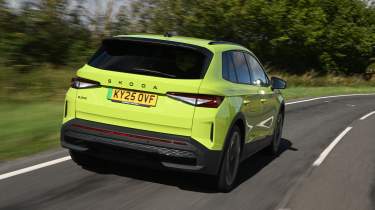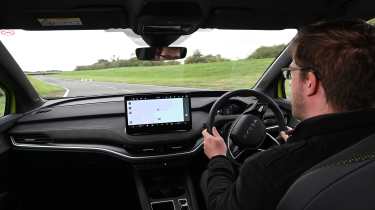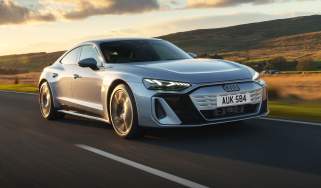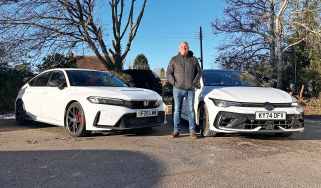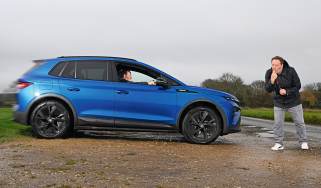New Skoda Elroq vRS review: hot SUV is good but needs to be great at this price
It may be the brand’s quickest car yet, but the Skoda Elroq vRS is the least recommendable version in an otherwise brilliant range

Verdict
The Skoda Elroq is a great family car, and the vRS version loses none of the practical touches that makes the regular model an award winner. Unfortunately for the quickest Skoda yet, it isn’t an entertaining performance car, and isn’t even as satisfying to drive as its less expensive siblings. If you must have a sporty looking Elroq, save yourself some money and go for the 85 SportLine; a car that’s more than quick enough and better value for money.
We’re big fans of the Skoda Elroq, having named it our overall Car of the Year back in July. All things considered then, this latest vRS version should be a showstopper – especially as it’s the brand's quickest car yet – yet we came away a little underwhelmed when we drove the car in the Czech Republic earlier this year. So, how does it fare on UK roads?
To recap, the Elroq vRS gets a dual-motor set-up producing a not inconsiderable 335bhp, enough to get it from 0-62mph in 5.4 seconds. That’s sufficient to leave following drivers in your wake when you put your foot down, but hardly exceptional when the more affordable MG4 XPower boasts 429bhp, and sprints to 62mph in a potentially lunch-losing 3.8 seconds.
Used - available now

2022 Volvo
V60
78,277 milesAutomaticPetrol2.0L
Cash £17,697
2025 Volkswagen
T-Roc
57,042 milesAutomaticPetrol1.5L
Cash £17,697
2022 Peugeot
2008
4,408 milesAutomaticPetrol1.2L
Cash £17,697
2024 Audi
A3 Saloon
14,556 milesManualPetrol1.0L
Cash £17,197But Skoda is a sensible brand producing practical family cars and spacious estates, so not being the quickest fits with the brand's image, and helps put it in a more affordable group 37 insurance rating versus the XPower in group 40. You can also make your Elroq vRS (or MG4 XPower for that matter) more affordable to buy by checking out our latest Elroq deals through our Auto Express Buy a Car service.
The vRS comes as standard with four-wheel drive to ensure it never struggles for traction. Working with a stability control system that keeps a tight rein on power, you can plant your foot on the throttle mid bend and you feel the car smoothly meter out the power to fire you out the other side without so much as a chirrup from the tyres.
It’s all very safe, but there’s no sensation that the four-wheel-drive system is shifting the power around like a Hyundai Ioniq 5 N does, and it doesn’t reward the enthusiast with a stimulating driving experience. That’s a shame because the regular rear-wheel drive Elroq is decent enough to drive, offering up a feeling of being pushed from behind when accelerating out of a corner like a traditional rear-driven car.
You are aware of this car’s weight, though. At over two tonnes, there’s a lot of mass to deal with. While that wasn’t enough to trouble the grip of the tyres on the dry day of our test, you do get the sense this car isn’t overly keen on quick changes of direction. The steering is precise for an electric SUV, and while lacking in feel and feedback, weighs up in a consistent manner when you’re pressing on. We found the steering to be artificially heavy in its sport setting; normal mode suits the car better.
Our test car had the optional (£820) 21-inch ‘Vision’ alloy wheels, and while they do look good in the photos, we’d stick with the standard 20-inch wheels. The optional wheels affect the ride with a sensation of falling clumsily into every pothole you encounter at higher speeds. This contributes to a head-bobbing, sea-saw like action when driving over speed bumps.
The mass of the Elroq also feels at odds with the comfort settings of its Dynamic Chassis Control (DCC) adaptive suspension system – standard on the vRS, but a £650 option as part of the Driver Package on Edition 85 and SportLine 85 trims of the regular Elroq. In this setting, the Elroq vRS feels far too soft and uncontrolled over undulations, while using a firmer variation makes the ride a little uncomfortable over rough surfaces.
Thankfully, the system is highly configurable, and we found the parameters just on the stiff side of normal offered the best compromise in regular driving, keeping things compliant while avoiding a floating sensation. At motorway speeds, the Elroq vRS is a very stable and relaxing place to be, with what little road and wind noise there is easily drowned out by the fine standard Canton sound system.
The brakes (discs at the front, drums on the rear) take a bit of getting used to because they don’t feel tuned for fast road driving. When slowing at higher speeds, the pedal feels initially quite firm, but you’ll find you have to push through this to get some meaningful power from the mechanical brakes. This sometimes leaves you in a situation where the car isn’t wiping off speed as quickly as you’d like, which isn’t ideal in a car as heavy as the Elroq vRS.
It’s a shame that the driving experience leaves a little to be desired then, because treated like a regular trim level rather than a high-performance model, it retains all the qualities that make the Elroq an award-winner.
It’s an easy car to drive with an excellent driving position, there’s plenty of space in the back for a pair of adults to comfortably sit behind a relatively tall driver, and there’s a big boot that’ll easily take a bulky pushchair or the weekly shop. We also like the handy pouch under the parcel shelf to store the charging cables – although its net design means you’ll probably want to ensure the cables are dry to prevent unwanted drips onto what you’ve got in the boot.
Our only complaint with the dashboard is that it doesn’t include the nifty smart dials of the Kodiaq and Superb for easy adjustment of the interior temperature, heated seats, and drive mode selection. Otherwise, the rest of the cabin is well made and has a nicer finish than the Volkswagen ID.3 it’s based on, with some tasteful vRS green highlights that go well with the free Hyper Green paint on the outside.
It would be good if it were a little more efficient, however. We only saw 2.7 mi/kWh and an indicated range of 220 miles to a charge – albeit over a fast and challenging test route that wasn’t entirely representative of how you might use the car day to day. It’s also a little disappointing that despite the hefty £46,500 starting price of the vRS, you still need to add £1,100 to get an energy-efficient heat pump, to help maintain your range in winter weather.
Did you know you can sell your car through Auto Express? We’ll help you get a great price and find a great deal on a new car, too.
| Model: | Skoda Elroq vRS |
| Price: | £46,560 |
| Powertrain: | 84kWh battery (79kWh usable), 2x e-motors |
| Power/torque: | 335bhp/545Nm |
| Transmission: | Single-speed automatic, four-wheel drive |
| 0-62mph: | 5.4 seconds |
| Top speed: | 111mph |
| Range/charging: | 339 miles / 185kW (10 to 80 per cent in 26 mins) |
| Size (L/W/H): | 4,488/1,884/1,637mm |
| On sale: | Now |
Best deals on the Skoda Elroq and its rivals

